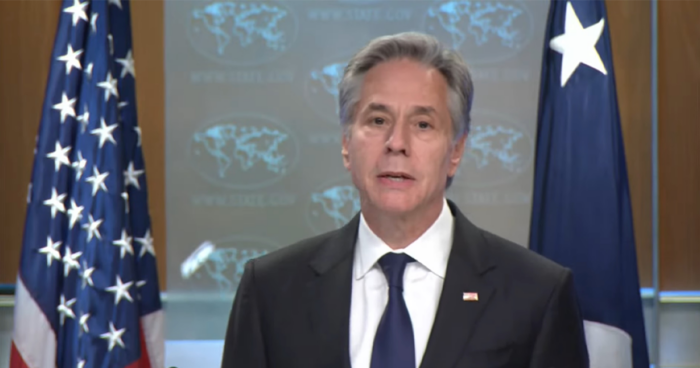
Secretary of State Antony Blinken speaks at a press conference on April 22, 2024 for the release of the State Department’s 2023 Country Reports on Human Rights Practices.
New reports from the US State Department identify a long list of Chinese government human rights abuses against the Tibetan people, underscoring the need to resolve Tibet’s status, the International Campaign for Tibet said today.
“These reports show that China is severely violating the human rights of the Tibetan people all across the globe,” ICT President Tencho Gyatso said. “Even inside the United States, China is discriminating against Tibetan Americans. In Tibet, China’s abuses are shocking.
“With Secretary Blinken traveling to China this week, we once again call on him to raise Tibet both privately and publicly during his trip. That includes reiterating to Chinese leaders that they must take part in dialogue with Tibetan officials to resolve Tibet’s status. China’s human rights abuses against the Tibetan people cannot continue, and its occupation of Tibet must come to a peaceful end.”
The State Department released the 2023 Country Reports on Human Rights Practices yesterday, April 22, 2024.
Read the Tibet section of the reports.
Human rights violations in Tibet
The reports show that China violated Tibetans’ human rights on a massive scale last year.
The violations included torture, arbitrary arrest and detention, censorship, transnational repression, restrictions on religious freedom, denial of democratic elections and much more.
A few of China’s abuses listed in the report are:
- Forcing Tibetan Buddhist monks to sign documents denouncing the Dalai Lama, their exiled spiritual leader
- Disappearing and torturing Tibetan political prisoners
- Requiring job applicants to “align ideologically, politically, and in action with the [Chinese Communist Party] Central Committee”
- Severely restricting Tibetans’ travel and freedom of movement
- Harassing and denying opportunities to the families of Tibetan self-immolators
- Depriving Tibetans of internet freedom, freedom of the press, the right to peacefully assemble and the right to change their government through free and fair elections
- Requiring monasteries to incorporate CCP members into their administrative systems. These members were tasked with overseeing various aspects, including monastic admissions, education, security and finances
- Criminalizing speech as spreading information “damaging to ethnic unity,” “subverting state power,” “undermining national unity” and “damaging the honor and interests of the state”
In addition, no international NGOs were reported to be active last year in the Tibet Autonomous Region, which spans less than half of Tibet. Government officials showed little cooperation or responsiveness to the perspectives of Tibetan or foreign human rights organizations.
The reports note that ICT expressed concerns over China reportedly collecting DNA from about 1 million residents of the Tibet Autonomous Region, as well as about Chinese authorities withholding household registrations from some Tibetans who traveled abroad, particularly those who went to India, the exile home of the Dalai Lama and the Central Tibetan Administration.
Resolving Tibet’s status
The reports arrive on the back of the US Senate Foreign Relations committee voting to approve the Promoting a Resolution to the Tibet-China Dispute Act on April 16.
Known as the Resolve Tibet Act, the bipartisan bill¬ will strengthen US efforts to get China back to the negotiating table with Tibetan leaders for the first time since 2010 to resolve Tibet’s status. The bill will also combat China’s disinformation about Tibet.
China has occupied Tibet for over 65 years, forcing the Dalai Lama to escape into exile in 1959. Under China’s iron rule, Tibet now has a total global freedom score of zero, according to the watchdog group Freedom House.
The Resolve Tibet Act can now move to the Senate floor for a vote. It already passed the House in February.
Earlier this year, members of the House also introduced a bipartisan resolution reaffirming support for Tibetans’ human rights—including their right to self-determination—and condemning China’s mass arrest of Tibetans who protested a destructive hydropower dam project in Derge (Chinese: Dege) county in eastern Tibet.
Blinken’s trip
The reports also come as Secretary Blinken prepares to travel to China April 24-26.
Blinken’s trip will overlap with the 35th birthday of the Panchen Lama, the Tibetan Buddhist leader whose ongoing disappearance by the Chinese government is mentioned in the reports.
ICT calls on Blinken to raise the issue of Tibet during his meetings with Chinese leaders, as well as publicly in front of the press.
The topics for Blinken to discuss include China’s disappearance of the Panchen Lama; its attempts to interfere in the succession of the Dalai Lama; and its responsibility to resume negotiations with Tibetan leaders.

